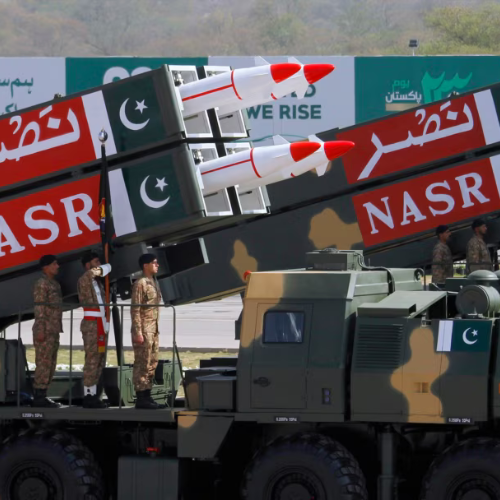The United States has raised concerns about Pakistan’s missile development program, claiming that the country may be building long-range missiles capable of striking targets far beyond South Asia, possibly even in the United States. This warning follows new sanctions imposed on Pakistan’s missile development agencies, which have been accused of working on technologies that could lead to these long-range missiles.
Growing Concern Over Long-Range Missiles
A senior official in the U.S. government has pointed out that Pakistan is developing increasingly sophisticated missile technology. These technologies include long-range ballistic missiles and equipment that can test bigger rocket engines. The U.S. worries that, if this trend continues, Pakistan could develop the ability to strike targets not just in its region, but also across the world, including the United States.
The U.S. government has been closely monitoring Pakistan’s missile development. The White House official expressed that it’s difficult to view Pakistan’s actions as anything other than a potential threat. The concern is that Pakistan is advancing its military capabilities in ways that might one day allow it to launch missiles far beyond its borders.
U.S. Sanctions on Pakistan’s Missile Program
In response to these concerns, the U.S. State Department has imposed sanctions on Pakistan’s missile development. The sanctions target the National Development Complex (NDC), a state-run agency that plays a central role in Pakistan’s missile program, as well as three private companies in Karachi. These companies are accused of contributing to the development of missiles and related technologies. The U.S. says these actions are meant to protect its national security and prevent the spread of dangerous missile technologies.
The sanctions have sparked strong reactions from Pakistan. Pakistan’s Foreign Ministry has rejected the accusations, calling them unfair and based on suspicion, without any solid evidence. The Ministry emphasized that Pakistan’s missile program is strictly defensive, designed to protect the country’s sovereignty and maintain stability in the region.
US Targets Pakistan’s Missile Program with New Sanctions
Diplomatic Tensions Between the U.S. and Pakistan
This development has added more tension to the already complex relationship between the U.S. and Pakistan. The United States has expressed concerns about Pakistan’s growing missile capabilities, while Pakistan insists its focus remains on defense, especially against threats from neighboring India.
In recent years, the U.S. has been strengthening its defense ties with India, including sharing advanced missile technology and collaborating on defense initiatives. This has led to concerns in Pakistan, which feels that the U.S. is favoring India, a rival in the region. Pakistan sees this as a shift in U.S. foreign policy, one that could upset the balance of power in South Asia and beyond.
Pakistan’s Defense Focus and Regional Concerns
Pakistan has been clear about its strategic goals: it is focused on defending itself against threats from the east, particularly from India. The country argues that its missile program is not aimed at the West, but rather at securing its borders and maintaining peace in the region. However, the U.S. sees these developments as a potential threat not just to South Asia but to global security.
Tensions between the U.S. and Pakistan over missile technology are not new, but the recent public statements and sanctions mark a more direct confrontation. Pakistan’s missile program is increasingly seen by some in Washington as a threat that could extend beyond its immediate neighbors.
This situation has brought to light ongoing concerns about the spread of missile technologies and the role of international sanctions in addressing these issues. While Pakistan insists on the defensive nature of its program, the U.S. is committed to preventing the spread of technologies that could lead to more powerful and long-range missiles in countries outside its control.


